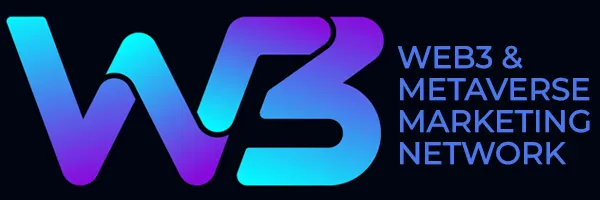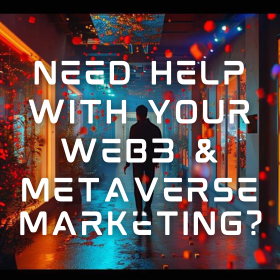The metaverse is swiftly evolving into a cornerstone of digital marketing strategy, and major brands like Coca-Cola, Samsung, Nike, and Gucci are leading the charge. For instance, Coca-Cola made headlines by auctioning its first-ever NFT collectibles, and the metaverse market is expanding with notable names such as Louis Vuitton and Sotheby’s entering the arena.
As consumers increasingly engage in virtual worlds for activities beyond gaming, such as virtual weddings and concerts, understanding your audience’s metaverse exploration is pivotal for incorporating Metaverse advertising effectively into your digital marketing strategy.
What Defines Metaverse Marketing?
To delve into metaverse marketing, one must grasp the concept of the metaverse itself and understand the audience it caters to. The metaverse is an extended reality where the physical and digital realms seamlessly merge, influencing how people shop, socialize, learn, work, and communicate. Users in the metaverse are represented by avatars, digital versions of themselves. Primarily targeting Millennials, Gen Z, and males, companies invested in the metaverse are shifting their marketing approach from flat media to immersive media.
Dr. Louis B. Rosenberg, an expert in augmented and virtual reality, emphasizes that metaverse marketing should be natural, personal, and intuitive. This implies moving beyond traditional media like text, images, and videos towards Virtual Product Placements (VPPs) and Virtual Spokespeople (VSPs) for a more immersive user experience.
Innovative Metaverse Marketing Strategies
Innovative strategies are crucial when marketing in the metaverse, as consumers perceive brands present in this space as highly innovative. Some cutting-edge approaches include:
- Virtual Billboards: Place ads on virtual billboards, providing interactive branded installations and events for user engagement.
- Offer Collectibles: Following Coca-Cola’s NFT success, consider offering limited-edition digital assets or items exclusive to the metaverse for users to collect.
- Virtual Product Placements (VPPs): Strategically showcase products to a targeted audience in specific virtual settings, creating an exclusive viewing experience.
- Virtual Spokespeople (VSPs): Employ AI-driven avatars to engage users in promotional conversations within the metaverse.
- Community Collaboration: Leverage existing communities within your target metaverse to co-create immersive experiences tailored to your brand.
Key Considerations and Risks
Entering the metaverse requires proactive planning for potential risks. Rules regarding user safety, misinformation, data privacy, intellectual property management, and customer experience should be established from the outset due to the real-time and immersive nature of events in the metaverse.
The Importance of Experimentation
Experimentation is paramount in metaverse marketing. Drawing inspiration from Snoop Dogg’s Snoopverse in The Sandbox, where NFT collections, avatars, and even a music video were integrated, brands must develop unique and experimental content for the metaverse. Balancing real-world marketing with immersive experiences is vital, and a strategic approach involves researching and testing various metaverse opportunities to find what resonates best with your brand.
Redefining Success Metrics
Traditionally, digital marketing success is measured by metrics such as clicks, shares, and conversions. However, these metrics are irrelevant in the metaverse. Brands must reimagine how success is gauged in this dynamic space, focusing on engagement, unique experiences, and brand loyalty.
The Unstoppable Rise of the Metaverse
Despite skepticism, the metaverse is here to stay. The investments by major brands, staggering virtual goods sales, the vast gaming community, and Meta’s rebranding (formerly Facebook) all affirm the metaverse’s significance. Anticipated trends supporting this assertion include:
- Growing Consumer Group: Millennials and Gen Z are expected to be major participants in future virtual worlds, driving income-earning potential within the metaverse.
- Technological Advances: Ongoing improvements in cloud computing and the rapid adoption of 5G are overcoming technical constraints, making the metaverse more accessible.
- Influencer Migration: Influencers, crucial in modern marketing, are likely to shift their focus to the metaverse, creating engaging experiences for their audience.
SEO in the Metaverse
Recognizing the visual nature of the metaverse, Google is adapting with innovations like Google Lens and augmented reality (AR) integrations. Visual search will play a central role in future search engine optimization (SEO), necessitating marketers to incorporate this into their digital marketing strategies.
In conclusion, the metaverse is reshaping the digital marketing landscape. Brands that understand its dynamics, experiment boldly, and adapt strategies to suit this immersive environment will undoubtedly lead the way in the metaverse era.
The Next
the metaverse presents an ever-expanding canvas for advertising and marketing. As we navigate this dynamic landscape, one certainty is the continuous unveiling of fresh opportunities and untapped channels. Each passing day, month, and year brings forth novel avenues to connect with customers, leveraging evolving experiences and technologies that are yet to be fully comprehended.
These times are undeniably thrilling, marked by the anticipation of exploring uncharted territories and embracing innovations that redefine how brands engage with their audience. As marketers adapt to the metaverse, the journey promises a continuous evolution, unveiling unprecedented ways to create meaningful connections and deliver immersive brand experiences.
In this era of constant discovery, staying agile and receptive to emerging technologies will be key. As we unlock the potential of the metaverse, the excitement lies in the unknown possibilities waiting to be harnessed, providing marketers with an ever-expanding toolkit to captivate audiences in ways previously unimaginable.
The metamorphosis of advertising and marketing in the metaverse is an ongoing narrative, and with each revelation, the industry is poised to rewrite the playbook, offering marketers the chance to be pioneers in a realm of infinite creativity and innovation. Undoubtedly, the journey ahead in the metaverse is one filled with promise and the prospect of shaping the future of digital interaction.











